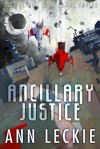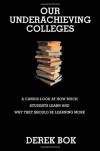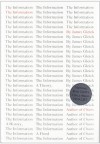Currently reading
McGlue
Knife Fight and Other Struggles
Far from the Tree: Parents, Children, and the Search for Identity
The Good Lord Bird
Ancillary Justice
Our Underachieving Colleges: A Candid Look at How Much Students Learn and Why They Should Be Learning More (New Edition)
Dissident Gardens
Nightmare Movies: Horror on Screen Since the 1960s
The Information: A History, a Theory, a Flood
Complete Novels
 "Not a friendly place--the future...."
"Not a friendly place--the future...."At the close of the Fall semester, I was suddenly gifted with a couple weeks without other major reading obligations (no papers to grade, no assigned books to keep tabs on), and so, for those last two weeks of 2008, I swallowed down as much prose as I could stomach. And, perhaps in an unconscious attempt to resist the annual cover-up of hostilities and angst in the obligatory back-slapping ye-of-good-cheer festivities, it seems like everything I've read has been about people being pretty fucking awful to one another.
On the other hand, as I'm writing that, it strikes me that not only would such a distilled plot-summary ("people being pretty fucking awful to one another") make sense for much literature, I probably prefer that to the other reductive central narrative ("people finding redemptive hope in one another").
I started with Morrison's excellent A Mercy, which sets up an odd, unsettling kind of utopia in America's deep past. We watch a small coterie of characters find (and then alas, inevitably, lose) a sense of hopeful community, across great chasms of experience, power, gender, culture, race. And even in those moments of hopeful possibility the novel is haunted by its future, by our history. It was a stunning bit of authorial magic, making me hope for a vision of human compassion which I know will be (has been) smashed, and even more astonishing to send me out of the novel's pages not crushed by that sense of lost potential, but to have that hope somehow revived by Morrison's ability to stare unblinkingly at human behavior.
Still, people do fucking awful things to one another. I then took a sidetrack into escapism, "low" culture some say: a few noirs, mostly unsatisfactory, in that when the people in the novels did fucking awful things to one another I was never goosed by the thrill of that awfulness, or (worse yet) the doing of awful things led to someone doing something good and right and noble (in order to... what? erase the readers' guilt at relishing the awfulness of prior actions?). Whereas in the one horror novel I read, people (and monsters) do horrible fucking things to one another, and the lurid thrill of awfulness neither fell into too-pat genre conventions nor tried to sneak in a moral--but rather found the hope in the horror, and vice versa.
Then, palate cleansed, I picked up Roberto Bolano's 2666, wherein at the margins, out of the corners of your eyes, as the book wanders with its author-obsessed critics and then its alienated Mexican lit professor, obliquely in stray passages people are doing fucking awful things to one another, and the book's recounting of obsessions and fragmented images of everyday life seem anchored around the dark shadow of such awful fucking things. It's a book both terribly compelling and intriguing yet resistant to my desires for a certain kind of narrative structure. So I set it down, to take a break with some more escapism. How about the future? Pull out my shades, 'cause Marusek's been touted for years by reviewers and readers I trust, and he hasn't been labelled dystopian, so--his future must be bright, right?
I first read his excellent first novel, which I found ... well, Dickensian. I've seen some complaints about how dense the book is in big ideas, at (some say) the cost of a stirring forward-moving plot, or even at characters. I reject utterly the latter; Marusek's short fiction is even better at conveying the concise emotional resonance of what his characters are experiencing at the interface of technology, social structures, and personal needs, but the novel still has such engagement spread out across a pantheon of intriguing characters. You can get swamped by the cross-cutting of the narrative between so many points of view, and by the staggering density of the imagined world each character inhabits, but it's got character development in spades. What it lacks is heroics, neat moral or psychological arcs. Marusek writes people (and clones, and AIs) without the useful props of Action. He's interested in how they live, and this can seem (I guess) offputting.
But I found it exhilirating, 'cause (back to my pretentious Dickens ref) he was writing about society. Sure, he has the doodads and geegaws of technological innovation which the genre promises. But he's interested in how systems (economic, interpersonal, cultural) evolve with, against, through, despite such innovations. And it's a pretty grim vision, laced through with those wispy hopes other authors noted above find even in the most awful fucking things people do to one another, but in a nutshell, Marusek is concerned with the way the new technologies reiterate (and exacerbate) the inequalities and stupidities and daily casual viciousness we experience now.
People doing awful fucking things to one another.
This review -- (review? really? meh) -- does no justice to the specific and rewarding wonders of Marusek's writing, which is damn fine, perhaps especially in his short fiction. But I am in a mood. Hence, the rant.
Now, back to Bolano.












